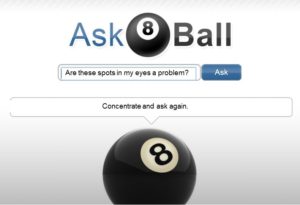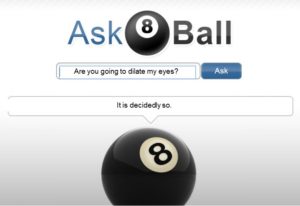Floaters

“Hey Doc, I see these little black spots in my vision sometimes, is this a problem?” I probably get this question at least once a week. Sometimes, I want to stop and say, let me get a quick consult…….

Although the above may be a poor attempt at humor, it highlights one of the common problems I have to deal with when faced with questions like this. The answer really is I don’t know; and you know those words are hard for a doctor to say. Without examining the eyes, I have no idea whether this is a simple case of vitreous floaters or a more ominous sign of a retinal detachment. I’ll generally start asking further questions to get a better idea of the likelihood of this being a serious problem. Before we tackle all the possibilities, let’s take a look of the part of the eye that’s involved.
The back half of the eye is essentially a space that is filled with a “bag” of a substance called vitreous. The outer wall of this “bag” (also called capsule) lies against the retina which is the vision sensing part of the eye. Light off of what you are viewing passes through the cornea, through the pupil, lens, through the vitreous and lands on the retinal. The image is changed into an electrical signal and sent through the optic nerve back to your brain that then interprets what you see. When everything is clear and working properly, you see “Maavelous”
https://www.youtube.com/watch?v=r7chGllVEks
Unfortunately, our bodies succumb to the processes of aging and your eye is no different. Over time, the clear vitreous gel will begin to liquify and little strands of fibers in the vitreous begin to form. These fibers in the vitreous are hit as light passes through the eye and cast a shadow on the retina. These shadows are interpreted by the brain as spots in your vision. Another thing that can happen is that as the vitreous begins to liquefy, it also shrinks causing the capsule to pull away from the retina. There is a strong attachment of the capsule where the optic nerve emerges into the eye and invariably when the vitreous pulls away, it pulls the attachment that is shaped like a ring away which then floats in the gel. We call this a Weiss’ ring. It looks like a doughnut with a clear center and is easily seen in this photo.
I wish I can have something named after me so that optometry students will have to memorize my last name. I guess I”ll just have to settle for an island.
There is also a strong connection of the vitreous to the peripheral retina. As the capsule of the vitreous begins to separate from the retina, the vitreous begins to pull on the retina. This excites the retina which responds by telling the brain it sees a flash of light. Sometimes, the vitreous capsule pulls away without any problems, but sometimes the connection is so strong that the retina is torn due to the pulling. This is a serious condition that can lead to a retinal detachment and blindness. The retina is highly vascularized (has lots of blood vessels running through it) so when it tears, it is very likely to tear a blood vessel which will then release red blood cells into the vitreous and cause you to see many black dots floating in your vision.,
We return to the original question, “Hey Doc, I see these little black spots in my vision, is this a problem?” Studies show that the presence of floaters have an 85% chance of not being a problem. And now you understand my dilemma. If I say yes, the person is thinking to themselves, do I really have a problem, or does he just want me to come in so that he can charge me/my insurance. If I say no, there is a 15% chance that something serious is going on that could ultimately lead to blindness. There are some things I ask to try to narrow down the risk such as:
- Length of time you’ve had the floaters? 15 years you say? Hmm…. Probably not gonna worry about that one;
- Is it associated with flashes? Flashes increase the likelihood of a retinal detachment;
- Is it always in the same spot or does it move around? Sometimes spots that don’t move can be a sign of a visual field defect.
Even with that, it is probably safest to examine the retina to make sure everything is ok. I have been surprised sometimes when looking at patients and expecting to tell them everything is ok only to find a retinal tear or hole that I have to send them off to have a laser treatment. Bottom line, if you don’t look, you don’t know, and as GI Joe always used to say, “knowing is half the battle”. So, when someone tells me that they are seeing spots in their vision, is it very likely that I”ll dilate them?



